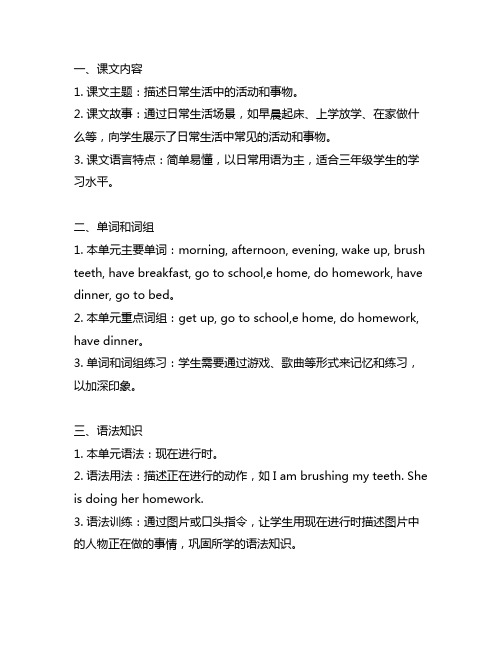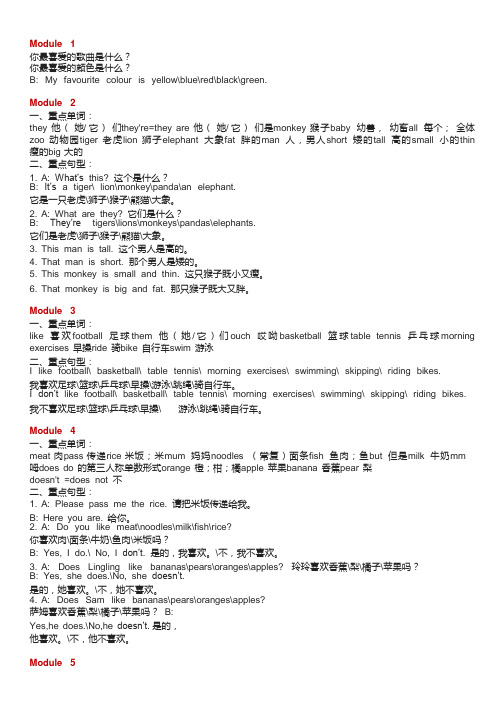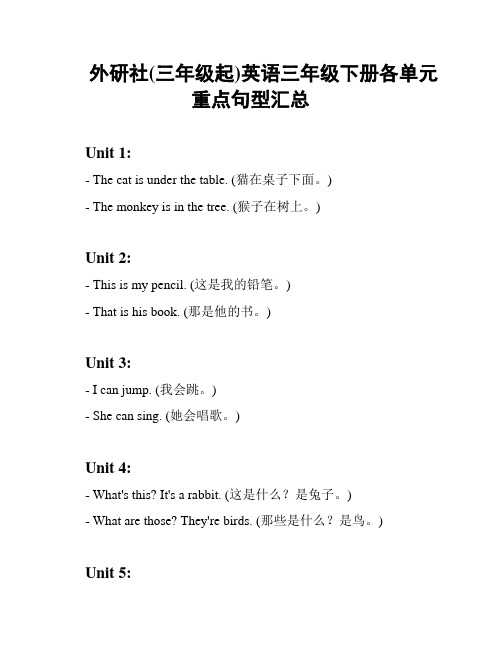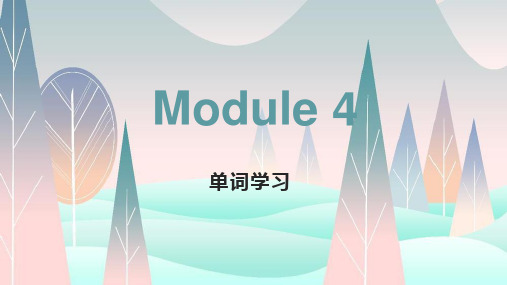(完整)外研社小学英语一起三年级下重点词汇及句子
外研社一起三年级下册英语知识点

一、课文内容1. 课文主题:描述日常生活中的活动和事物。
2. 课文故事:通过日常生活场景,如早晨起床、上学放学、在家做什么等,向学生展示了日常生活中常见的活动和事物。
3. 课文语言特点:简单易懂,以日常用语为主,适合三年级学生的学习水平。
二、单词和词组1. 本单元主要单词:morning, afternoon, evening, wake up, brush teeth, have breakfast, go to school,e home, do homework, have dinner, go to bed。
2. 本单元重点词组:get up, go to school,e home, do homework, have dinner。
3. 单词和词组练习:学生需要通过游戏、歌曲等形式来记忆和练习,以加深印象。
三、语法知识1. 本单元语法:现在进行时。
2. 语法用法:描述正在进行的动作,如I am brushing my teeth. She is doing her homework.3. 语法训练:通过图片或口头指令,让学生用现在进行时描述图片中的人物正在做的事情,巩固所学的语法知识。
四、听说读写技能1. 听:通过听力练习,让学生能够听懂日常生活中的常见活动和事物的名称。
2. 说:通过口语练习,让学生能够用英语描述自己日常生活中的活动。
3. 读:通过阅读课文和相关练习,让学生掌握本单元的词汇和句型。
4. 写:通过书写练习,让学生能够用英语描述自己的日常生活,并且能够正确使用现在进行时。
五、学习方法1. 多听:通过听力练习,让学生多次听到课文内容和相关单词,以加强记忆。
2. 多说:引导学生多说英语,如用英语描述自己的日常活动。
3. 多读:通过阅读相关练习,让学生熟练掌握本单元的词汇和句型。
4. 多写:通过书写练习,让学生巩固所学的语法知识,提高书面表达能力。
总结:本单元主要内容是描述日常生活中的活动和事物,重点单词和词组包括morning, afternoon, evening, wake up, brush teeth, have breakfast, go to school,e home, do homework, have dinner, go to bed。
外研三起三年级下册期中知识点

外研版三起三年级下册期中知识点一、重点单词:食物类:meat肉 rice米饭noodles面条fish鱼肉milk牛奶水果类:banana香蕉pear梨orange橘子apple苹果动物类:monkey猴子tiger老虎lion狮子elephant大象球类:football足球basketball篮球table tennis乒乓球名词:song歌曲TV电视台colour颜色zoo动物园bike自行车work工作地点Monday星期一Saturday星期六phone电话friend朋友动词:like喜欢ride骑skip跳绳swim游泳play参加形容词:favourite最喜爱欢的反义词:tall高的—short矮的fat胖的---thin瘦的big大的---small小的二、重要词组:go to school上学at home在家go to work上班go shopping去购物on the phone通电话at home在家go to work去上班play football/basketball/table tennis踢足球/打篮球/打乒乓球三、重点句型:1.----What’s your favourite song? 你最喜爱的歌曲是什么?----It’s the ABC song. 是ABC之歌。
2.----What’s your favourite colour? 你最喜爱的颜色是什么?----My favourite colour is yellow,blue, red,black,green. 我最喜爱的颜色是黄色蓝色红色黑色绿色。
3.---- Here you are. 给你----Thank you.谢谢。
4.----What color ? 什么颜色?----It’s red.它是红色的。
5.----What’s this? 这个是什么?(单数)----It’s a tiger lion/monkey/panda/an elephant.它是一只老虎狮子猴子熊猫大象。
(完整)外研社小学英语一起三年级下重点词汇及句子

外研社一起三年级下册重点短语及句子M1a bit 一点make an e-card / make e-cards 制作电子贺卡(注意单数时要有冠词an)do one’s Maths/ English/ Chinese/ Science做数学/语文/英语/科学作业1. This is Maomao. She’s very nice. 这是猫猫,她很善良。
(nice可以用别的形容词替换)2. She always helps people. 她总是帮助人们。
(注意时态,动词要有变化)3. He can make e-cards. 他会做电子贺卡。
(情态动词can后面+动词原形)4. But he’s a bit shy. 但是他有一点害羞5. I’ve got another friend. 我有另一个朋友6. I’m helpful. 我很有帮助7. This girl can’t do her Maths. 这个女孩不会做数学8. I’m going to help her. / He’s going to help you. 我将要帮助她。
(不同的主语对应不同的be动词)9. What’s ten plus/and eleven? It’s twenty-one.10+11等于多少?等于2110. And one more? 再加1?(one可以换成其他数字)11. This boy will cry. 这个小男孩要哭了M2Big BenTower BridgeGreen Park / Red Park****注意,有的景点前面由the,有的没有the River Thamesthe London Eyehigh up in the sky 高挂在天空1. It’s about London. 它是关于伦敦的2. I’m from London.我来自伦敦。
(London 可以被任何城市名、国家名替换)3. This river is very wide. And it’s very long.这条河很宽,也很长。
外研社版三起小学三年级英语下册知识点汇总

Module 1你最喜爱的歌曲是什么?你最喜爱的颜色是什么?B: My favourite colour is yellow\blue\red\black\green.Module 2一、重点单词:they 他(她/ 它)们they're=they are 他(她/ 它)们是monkey 猴子baby 幼兽,幼畜all 每个;全体zoo 动物园tiger 老虎lion 狮子elephant 大象fat 胖的man 人,男人short 矮的tall 高的small 小的thin 瘦的big 大的二、重点句型:1. A:What’s this?这个是什么?B: It’s a tiger\ lion\monkey\panda\an elephant.它是一只老虎\狮子\猴子\熊猫\大象。
2. A: What are they? 它们是什么?B: They’re tigers\lions\monkeys\pandas\elephants.它们是老虎\狮子\猴子\熊猫\大象。
3. This man is tall.这个男人是高的。
4. That man is short.那个男人是矮的。
5. This monkey is small and thin.这只猴子既小又瘦。
6. That monkey is big and fat.那只猴子既大又胖。
Module 3一、重点单词:like 喜欢football 足球them 他(她/它)们ouch 哎呦basketball 篮球table tennis 乒乓球morning exercises 早操ride 骑bike 自行车swim 游泳二、重点句型:I like football\ basketball\ table tennis\ morning exercises\ swimming\ skipping\ riding bikes.我喜欢足球\篮球\乒乓球\早操\游泳\跳绳\骑自行车。
外研版英语(一年级起点)三年级下册重点句子句型衡水体描红英语字帖

外研版(一年级起点)英语三年级下册重点句子句型衡水体描红版英语字帖说明:黑白打印,效果正常。
如网页显示单词对不齐线格,请放心下载,原文件是正常的。
Module11.Look!The elephant is clever.看!大象是聪明的。
2.This is Maomao.She’s very nice.She always helps people.这是毛毛。
她很友善,总是帮助人们,But she’s a bit shy.但是她有点害羞。
3.This is Xiaoyong.He’s very clever.He can make e-card.这是小勇。
他很聪明,会做电子贺卡,But he’s a bit quiet.但是他有点内向。
4.I’ve got another friend.He’s very,very naughty.我有另一个朋友。
他非常非常调皮,But we all like him.但是我们都很喜欢他。
5.This little girl can’t do her maths.这个小女孩不会做数学题。
I’m going to help her.我要去教她。
6.—What’s ten plus ten?十加十是多少?—Twenty.二十。
Module21.This house is big,but that one is small.这座房子是大的,但是那座房子是小的。
2.This tree is big,but that one is small.这棵树是大的,但是那棵树是小的。
3.Look at this book.It’s about London.I’m from London.看这本书,是关于伦敦的。
我来自伦敦。
4.It’s the River Thames.It’s very long and wide.它是泰晤士河,“学习有智慧淘店”制作它很长很宽。
5.The London Eye is like a big,round eye!伦敦眼像一个大大的,圆圆的眼睛。
外研社(三年级起)英语三年级下册各单元重点句型汇总

外研社(三年级起)英语三年级下册各单元重点句型汇总Unit 1:- The cat is under the table. (猫在桌子下面。
)- The monkey is in the tree. (猴子在树上。
)Unit 2:- This is my pencil. (这是我的铅笔。
)- That is his book. (那是他的书。
)Unit 3:- I can jump. (我会跳。
)- She can sing. (她会唱歌。
)Unit 4:- What's this? It's a rabbit. (这是什么?是兔子。
)- What are those? They're birds. (那些是什么?是鸟。
)Unit 5:- What do you want? I want a toy car. (你想要什么?我想要一辆玩具车。
)- What does she want? She wants a doll. (她想要什么?她想要一个洋娃娃。
)Unit 6:- Can you swim? Yes, I can. (你会游泳吗?是的,我会。
)- Can he run? No, he can't. (他会跑步吗?不,他不会。
)Unit 7:- I like dogs. (我喜欢狗。
)- She likes cats. (她喜欢猫。
)Unit 8:- Where are you going? I'm going to the park. (你去哪里?我去公园。
)- Where is he going? He's going to the supermarket. (他去哪里?他去超市。
)Unit 9:- I have a new dress. (我有一条新裙子。
)- He has a big balloon. (他有一个大气球。
)Unit 10:- What color is it? It's blue. (它是什么颜色?它是蓝色的。
外研社小学英语一年级起点三年级下册 Module4 单词学习

单词 one two three four five six seven eight nine ten
ቤተ መጻሕፍቲ ባይዱ
含义 1 2 3 4 5 6 7 8 9 10
单词小结
单词 eleven twelve thirteen fourteen fifteen sixteen seventeen eighteen nineteen twenty
含义 11 12 13 14 15 16 17 18 19 20
Part2 学习课文单词
采摘 pick
pear
peach
orange
apple
水果 fruit
担心;害怕 afraid
例句: 他十分害怕蜘蛛 He is afraid of spiders.
We’ll go to the zoo.Peppa , George.
Module 4
单词学习
Part1 学习1-20表达
1-10表达 one two three four five six seven eight nine ten
Numbers: connect one to ten
Fill in the number
eight
two
nine
one
three
four six seven
观察: 3和13、5和15、8和18
13、15、18没有直接在3、5、8数字英文 后面加teen
Numbers: connect one to twelve
Numbers: connect one to fifteen
Complete calculation
one + ten = eleven two + ten = twelve
小学英语外研社新标准(一起)三年级下册单词带音标词性

外研版新标准(一起点)三年级英语(下册)单词汇总表带音标带词性Module 1nice [naɪs] adj. 友善的always [ˈɔ:lweɪz] adv. 总是a bit [əbit] 有一点shy [ʃaɪ] adj. 害羞的e-card ['i:k'ɑ:d] n. 电子名片quiet [ˈkwaɪət] adj. 安静的another [əˈnʌðə(r)] pron. 另一个him [hɪm] pron. 他(宾格)parrot [ˈpærət] n. 鹦鹉twenty [ˈtwenti] num. 二十helpful [ˈhelpfl] adj. 有帮助的maths [mæθs] n. 数学plus [plʌs] v. 加上more [mɔ:(r)] adv. 更多的Module 2about [əˈbaʊt] prep. 关于river [ˈrɪvə(r)] n. 河wide [waɪd] adj. 宽的old [əʊld] adj. 古老的clock [klɒk] n. 钟wheel [wi:l] n. 轮子round [raʊnd] adj. 圆的will [wɪl] 将you'll [ju:l] =you will 你将tower [ˈtaʊə(r)] n. 塔bridge [brɪdʒ] n. 桥Module 3won’t [wəʊnt] =will not 将不countryside [ˈkʌntrisaɪd] n. 农村;乡下farmer [ˈfɑ:mə(r)] n. 农民;农场主there [ðeə(r)] adv. 在那里lots of [lɒts əv] 许多的,大量的breakfast [ˈbrekfəst] n. 早餐have breakfast [hæv ˈbrekfəst] 吃早饭tea [ti:] n. 茶;茶叶tea party [ti: ˈpa:ti] (下午的)茶会;茶话会Module 4pick [pɪk] v. 采,摘(花,水果)fourteen [ˌfɔ:ˈti:n] num. 十四sixteen [ˌsɪksˈti:n] num. 十六eighteen [ˌeɪˈti:n] num. 十八thirteen [ˌθɜ:ˈti:n] num. 十三fifteen [ˌfɪfˈti:n] num. 十五seventeen [ˌsevnˈti:n] num. 十七nineteen [ˌnaɪnˈti:n] num. 十九afraid [əˈfreɪd] adj. 担心的feel [fi:l] v. 感觉;觉得all right [ɔ:l rait] 好,行Module 5tomorrow [təˈmɒrəʊ] n. 明天Monday [ˈmʌndeɪ] n. 星期一why [waɪ] adv. 为什么Why not ? [waɪnɔt] 为什么不呢?Tuesday [ˈtju:zdeɪ] n. 星期二Wednesday [ˈwenzdeɪ] n. 星期三Thursday [ˈθɜ:zdeɪ] n. 星期四next [nekst] adj. 下一个的week [wi:k] n. 周Module 6stamp [stæmp] v. 跺脚,用力踩computer [kəmˈpju:tə(r)] n. 电脑shall [ʃəl] 该,要arm [ɑ:m] n. 胳膊Module 7class [klɑ:s] n. 班级any [ˈeni] pron. 一些任何一个ask [ɑ:sk] v. 问question [ˈkwestʃən] n. 问题forty [ˈfɔ:ti] num. 四十so [səʊ] conj. 因此about [əˈbaʊt] adv. 大约thirty [ˈθɜ:ti] num. 三十Module 8hard [hɑ:d] adv. 努力地lazy [ˈleɪzi] adj. 懒惰的parent [ˈpeərənt] n. 父母Parents' Day [ˈpeərənts dei] n. 家长日speak [spi:k] v. 说话with [wɪð] prep. 对于quite [kwaɪt] adv. 很,非常good at [gʊd æt] 擅长English [ˈɪŋglɪʃ] n. 英语,英语课PE=physical education n. 体育,体育课Chinese [ˌtʃaɪˈni:z] n. 中文art [ɑ:t] n. 艺术,美术report [rɪˈpɔ:t] n. 成绩报告单try [traɪ] v. 努力,尝试Module 9were [wə(r)] 是(are的过去式)young [jʌŋ] adj. 年轻的beautiful [ˈbju:tɪfl] adj. 漂亮的was [wɒz] 是(is的过去式)also [ˈɔ:lsəʊ] adv. 也then [ðen] adv. 在那时who [hu:] pron. 谁grandparent [ˈgrændpeərənt] n. 祖父母old [əʊld] adj. 老的yesterday [ˈjestədeɪ] n. 昨天weren't [wɜ:nt] = were not 不是wasn't [wɒznt] = was not 不是fun [fʌn] adj. 有趣的Module 10second [ˈsekənd] n. 第二floor [flɔ:(r)] n. 层worried [ˈwʌrid] adj. 担心的find [faɪnd] v. 发现;找到first [fɜ:st] n. 第一remember [rɪˈmembə(r)] v. 记得Mother’s Day [ˈmʌðəz dei] n. 母亲节vegetable [ˈvedʒtəbl] n. 蔬菜last [lɑ:st] n. 上一个。
- 1、下载文档前请自行甄别文档内容的完整性,平台不提供额外的编辑、内容补充、找答案等附加服务。
- 2、"仅部分预览"的文档,不可在线预览部分如存在完整性等问题,可反馈申请退款(可完整预览的文档不适用该条件!)。
- 3、如文档侵犯您的权益,请联系客服反馈,我们会尽快为您处理(人工客服工作时间:9:00-18:30)。
外研社一起三年级下册重点短语及句子M1a bit 一点make an e-card / make e-cards 制作电子贺卡(注意单数时要有冠词an)do one’s Maths/ English/ Chinese/ Science做数学/语文/英语/科学作业1. This is Maomao. She’s very nice. 这是猫猫,她很善良。
(nice可以用别的形容词替换)2. She always helps people. 她总是帮助人们。
(注意时态,动词要有变化)3. He can make e-cards. 他会做电子贺卡。
(情态动词can后面+动词原形)4. But he’s a bit shy. 但是他有一点害羞5. I’ve got another friend. 我有另一个朋友6. I’m helpful. 我很有帮助7. This girl can’t do her Maths. 这个女孩不会做数学8. I’m going to help her. / He’s going to help you. 我将要帮助她。
(不同的主语对应不同的be动词)9. What’s ten plus/and eleven? It’s twenty-one.10+11等于多少?等于2110. And one more? 再加1?(one可以换成其他数字)11. This boy will cry. 这个小男孩要哭了M2Big BenTower BridgeGreen Park / Red Park****注意,有的景点前面由the,有的没有the River Thamesthe London Eyehigh up in the sky 高挂在天空1. It’s about London. 它是关于伦敦的2. I’m from London.我来自伦敦。
(London 可以被任何城市名、国家名替换)3. This river is very wide. And it’s very long.这条河很宽,也很长。
4. This is Big Ben. It’s very tall. 这是大笨钟,它很高5. In this park, you will see a wide river. 在这个公园,你会看见一条很宽的河6. I want to visit London. 我想去游览伦敦7. Come to my house. 来我家吧8. **The London Eye goes round and round, high up in the sky.伦敦眼高挂在天空转啊转M3go to the zoo去动物园go to school 去学校visit my grandpa 拜访我爷爷in the countryside在乡下lots of = a lot of 很多have breakfast/lunch/dinner吃早/午/晚饭have a tea party吃下午茶play with toys玩玩具read books 读很多书fly one’s kite放风筝1. What will you do? I will go to school.你将做什么,我将去学校(school前没有the)2. What will you see? 你将看到什么?3. Will Sam go, too? Yes, he will. Sam也去吗?是的,他也去。
(too前有标点“,”)4. I will see lots of pigs. 我将看见很多猪lots of +复数5. Will you go to the park this weekend? Yes, I will. / No, I won’t.周末你去公园码?是,我去6. Will we have breakfast at 7? 我们7点吃早饭吗?(三餐前无the)7. **I will see some boys playing with toys.我看见一些男孩在玩玩具8. **That’s what I’ll see.那是我看见的M4pick fruit/ pick the fruit 摘水果on the tree在树上go home回家all right好1. We’ll pick fruit.我们将要摘水果2. I don’t like apples. / He doesn’t like fruit.我不喜欢苹果/ 他不喜欢水果3. What other fruit will we pick? 我们还要摘什么水果?4. I’ll pick 12 pears.我要摘12个梨(名词要变复数)5. Let’s go now. 我们出发吧(Let’s+动词原型)6. Will we pick peaches? Yes, we will.我们将要摘桃子吗?是的7. I’ve got 16 apples.我有16个苹果8. Let’s count them.我们一起数数9. I’m afraid we can’t see all the peaches.我恐怕我们看不见所有的桃子10. I feel tired.我觉得累了11. **Wash it clean. 把它洗干净12. **Here’s my favourite fruit.这个是我最喜欢的水果M5go to Hong Kong去香港a good idea好主意take one’s kite 带某人的风筝have a picnic 去野餐on holiday度假next week下周go swimming去游泳play with my friends和我的朋友玩耍do one’s homework做某人的作业play the drums打鼓watch TV看电视1. Will you take your ball tomorrow? No, I won’t.你明天带球去吗?不,我不带2. We are going to have a picnic on Saturday.我们周六将去野餐(不要忘了a)3. That’s a good idea.那是好主意4. Why not? 为什么不呢?5. Tomorrow is Friday.明天周五(没有冠词the)6. We are on holiday next week.下周我们去度假7. What will you do? On Monday, I will go swimming.你将要做什么?周一将去游泳。
( on Monday 可以放句前,也可以放在句后)8. **That will be the week for XXX.这将是XXX的一周(安排)。
(不要落了be动词)M6draw a picture 画一幅画on the computer 在电脑上have a look 看一看Here are/Here is 这是…/这些是…on your face 在你的脸上in the tree/ on the tree 在树上Good idea! 好主意!We are going to draw a picture on the computer. 我们将在电脑上花张画(要用on)What shall we draw? 我们要画什么?(shall只用于第一人称,I &We做主语)Let’s draw a monster on the computer.让我们在电脑上画个怪物吧。
(要用on)The monster has got ……这个小怪物有……There is a nose on your face. 它脸上有个鼻子。
(要用on)They are all on your face.它们都在你脸上。
all放在Be动词后面**There are 3 green birds standing in the tree. 树上站着3只绿色的鸟。
(注意in the tree/ on the tree的区别)**There is no parrot standing in the tree. 树上没有站着鹦鹉(注意in the tree/ on the tree的区别)M7in a class 在一个班里(class前通常没有冠词,这里a表示数词one)at the zoo 在动物园(在动物园要用at)in a row 在一排in the picture 在图片里in your school 在你学校Can I ask you a question? 我能问你一个问题吗?(不要忘了a)We have got more friends in China. 我们有更多的朋友在中国。
**40 monkeys go high and low. 40只猴子一会爬高一会爬低M8speak to your teacher 和你的老师谈话Parents’ Day家长日in class在班级(class前通常没有冠词)be happy with…对……满意try hard at 在……试着努力work hard at 在……努力(at后面+学科)be good at 在某方面擅长(at后面+学科)run fast in 在……跑得快It’s Parents’ Day. 今天是家长日(注意’在s的后面)He works hard. 他工作很努力(注意人称变化,动词的变化)We are going to speak to your teacher. 我们将要和你的老师谈话(不要忘了to)I’m happy with that. 我对那很满意(with后面+名词)I will work really hard. 我会很努力的工作What does it say? 它怎么说的?She’s quite good at English. 她很擅长英语(at后面+学科)She tries hard at Science. 她在科学课很努力(at后面+学科)She runs fast in PE. 她体育课跑的很快(in后面+学科)**When I look at its face, I laugh and laugh. 当我看着它的脸,我笑啊笑(when 当……时候)M9in London/Beijing 在伦敦/北京(城市前没有冠词)in the holiday 在假期里at his home 在他家They were very young then. 他们那时候很年轻Yes. But they are very old now. 是的,但是他们现在很老了Your hair was very short then. 你的头发那时候很短Yes, now it’s long. 是的,现在长了He was in Hong Kong.他之前在香港They were in London with my grandparents. 他们之前和我的祖父母在伦敦I was with Daming at his home. 我之前和Daming在他家It was fun. 它很有趣。
